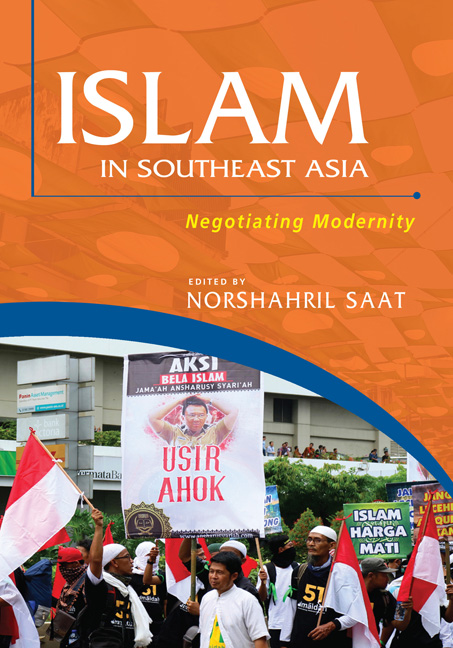Book contents
- Frontmatter
- Contents
- Preface
- About the Contributors
- 1 Introduction
- Section I Malaysia
- Section II Indonesia
- 5 The Middle East Influence on the Contemporary Indonesian “Campus Islam”
- 6 Contemporary Middle Eastern Islamic Thought and its Transmission in Indonesia: A Critical Assessment
- 7 Plural Islam and Contestation of Religious Authority in Indonesia
- 8 Preachers-cum-Trainers: The Promoters of Market Islam in Urban Indonesia
- Section III Singapore
- Index
7 - Plural Islam and Contestation of Religious Authority in Indonesia
from Section II - Indonesia
Published online by Cambridge University Press: 08 June 2019
- Frontmatter
- Contents
- Preface
- About the Contributors
- 1 Introduction
- Section I Malaysia
- Section II Indonesia
- 5 The Middle East Influence on the Contemporary Indonesian “Campus Islam”
- 6 Contemporary Middle Eastern Islamic Thought and its Transmission in Indonesia: A Critical Assessment
- 7 Plural Islam and Contestation of Religious Authority in Indonesia
- 8 Preachers-cum-Trainers: The Promoters of Market Islam in Urban Indonesia
- Section III Singapore
- Index
Summary
Tawaf [ritual circling around the Ka'bah]… done (Defending Islam Action I), Sa'i [ritual walking]… done (Defending Islam Action II), Wuquf [standing before God] … done (Defending Islam Action III), one more ritual [to complete the hajj], i.e. throwing stones to the devils (ramy al-jamarat).
INTRODUCTION
This is one of the famous metaphors, circulated widely in the form of meme, to describe the series of Aksi Bela Islam (Defending Islam Action), held in Jakarta on 14 October 2016, 4 November 2016, and 2 December 2016. In terms of scale, these religion-motivated rallies were unprecedented. It is comparable to the rallies before the fall of Suharto in 1998. The latter, however, is solely triggered by political issues. A similar instance, known as the alleged case of blasphemy by Martodharsono, created a series of rallies in 1918, when Martodharsono wrote an article about Islam in Djawi Hisworo. Subsequent rallies with the name “Tentara Kandjeng Nabi Muhammad” (TKNM) or “the Army of the Lord Prophet Muhammad” were organized by Sarekat Islam and attracted thousands of people (Alfan 2016; Agung DH 2016).
Fealy (2016) perceives the rallies as “further evidence of deepening conservatism in Indonesian Islam” or, in the view of Jones (2016), these are the precise reasons “why Indonesia has been ineffective in curbing extremism”. This chapter intends to show that this phenomenon can also be seen as a critical event to trace the development of religion in Indonesia, particularly on the issue of fragmentation and contestation of religious authority. Before the rally, the chairman of Nahdlatul Ulama (NU), Said Aqil Siradj, warned NU members against joining the third rally on 2 December 2016. Despite his advice, some NU members still supported Habib Rizieq Syihab, one of the leaders of the rally. Even the fatwa from the NU on the prohibition of conducting Friday prayer in the streets on 2 December 2016 was ignored by some of its members. A reflection of disobedience to the central leadership of the NU, some pesantren (religious boarding schools) in Jakarta and West Java, such as Ciamis and Tasikmalaya, even sent some of its students to join the rally in the National Monument Tower (Monas), Jakarta.
- Type
- Chapter
- Information
- Islam in Southeast AsiaNegotiating Modernity, pp. 140 - 163Publisher: ISEAS–Yusof Ishak InstitutePrint publication year: 2018

